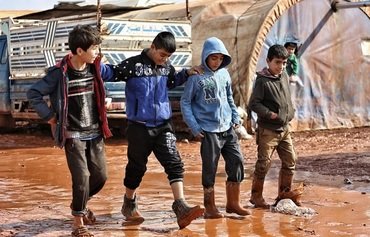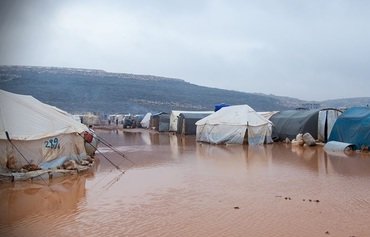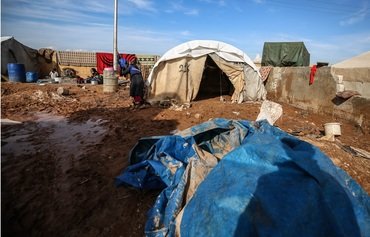Some landowners in Idlib and Hama provinces have been paying Tahrir al-Sham to forcibly remove internally displaced persons (IDPs) from encampments in these areas, an Idlib province activist said.
Tahrir al-Sham officials have received large bribes from landowners to remove IDPs from certain properties, activist Musab Assaf told Diyaruna.
No alternative accommodation has been offered to these families, he said.
Tahrir al-Sham officials have gone to several camps to inform the displaced population to leave them as soon as possible, Assaf said, noting that at least two camps have been forcibly evacuated so far.
![Forced to flee their homes by ongoing airstrikes and shelling, many Syrians from the country's north-west have taken shelter in makeshift camps like this one, in Idlib province. [Photo courtesy of al-Bawaba - Syria]](/cnmi_di/images/2020/10/12/26457-Syria-Idlib-IDPs-600_384.jpg)
Forced to flee their homes by ongoing airstrikes and shelling, many Syrians from the country's north-west have taken shelter in makeshift camps like this one, in Idlib province. [Photo courtesy of al-Bawaba - Syria]
According to Assaf, Tahrir al-Sham clashed with IDPs, and fired warning shots.
Evacuations 'unfair, unreasonable'
The displaced families who were forced to leave the encampments where they had sought refuge from ongoing shelling and airstrikes were enraged, Assaf said, as they were given no alternative place to stay.
They have been living under very tough circumstances in camps over the past six years, but at least they had a place to stay, he said, noting that leaving the camps would be equal to homelessness for them.
One camp, near the town of Aqrabat in northern Idlib, houses people from northern rural Hama and southern rural Idlib.
The displaced population of that camp was told that a school and a mosque was to be built on the campsite, so they would have to leave, Assaf said.
Residents of another camp in northern Idlib, as well as al-Bardaqli camp near the city of Sarmada, also were told to leave under the pretext of the expansion of a nearby stone quarry, Assaf said.
The stone quarry is owned by a Tahrir al-Sham official.
Former Maaret al-Numan resident Hani al-Numan told Diyaruna he has recently relocated his family to a town near the Turkish border.
According to al-Numan, Tahrir al-Sham "shows its true colours every day through its treatment of civilians".
Expelling the displaced community from camps is unreasonable and unfair, he said.
Tahrir al-Sham reaps revenue from fuel sales and exorbitant taxes, he said, so it could easily house IDPs in a number of alternate camps.
Instead, "Tahrir al-Sham officials are motivated by their personal interests at the expense of thousands of families", al-Numan said.
No alternate shelter
Winter is fast approaching, and with it difficult conditions for displaced families amid looming cold weather, rain and frost.
In search of shelter from the elements or temporary housing, many families will have to double up and share a tent with another family, al-Numan said.
This poses a great risk in light of the spread of novel coronavirus (COVID-19), with outbreaks already raising alarm in the province.
Dozens of displaced people protested Tahrir al-Sham's actions, but the extremist alliance quickly quelled the demonstrations.
White Helmets volunteer Khaled al-Khatib told Diyaruna that north-western Syria, including Idlib and parts of Aleppo and Hama provinces, is home to 1,293 official camps.
These camps collectively house more than a million displaced people, he said, while an additional 400-some unofficial camps house about 200,000 IDPs.
Already overcrowded official camps are largely unable to accommodate additional IDPs, he said, so it is difficult to find shelter for newly displaced people.
Aid organisations operating in north-western Syria can barely secure the bare necessities for the displaced, he said, and are unable to expand camps or build new ones.
Given the scarcity of jobs, makeshift camps are generally set up by unemployed, extremely poor groups of families, or a family and their relatives who have no other choice for shelter, he added.

![Displaced persons who were sheltering in al-Bardaqli camp were ordered to leave the encampment by Tahrir al-Sham officials. [Photo courtesy of the Saed charitable organisation]](/cnmi_di/images/2020/10/12/26458-Syria-IDPs-camps-600_384.jpg)






